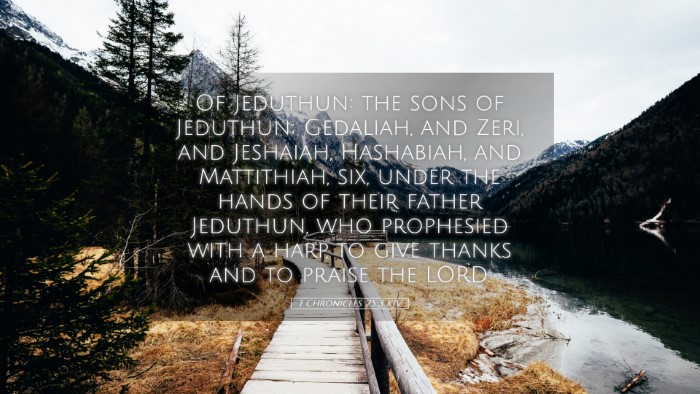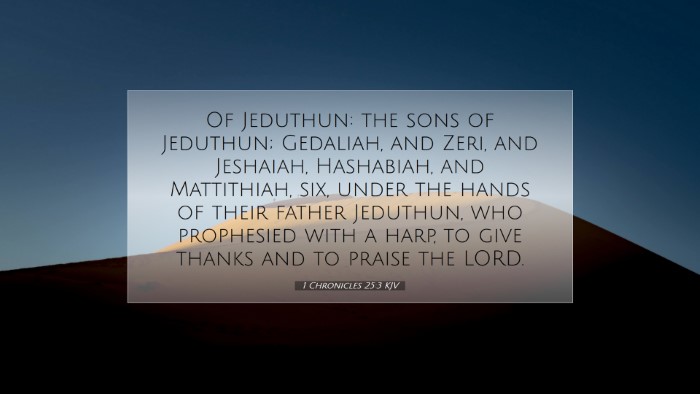Commentary on 1 Chronicles 25:3
Biblical Context: The Book of Chronicles serves to re-establish the identity and purpose of Israel, focusing on the lineage, the priesthood, and the importance of worship. 1 Chronicles 25 discusses the organization of the Levites, particularly the musicians who served in the temple, which was crucial for the cultural and spiritual life of Israel.
Verse Analysis: 1 Chronicles 25:3
This verse states: “Of Jeduthun: the sons of Jeduthun; Gedaliah, and Zeri, and Jeshaiah, Hashabiah, and Mattithiah, six, under the hands of their father Jeduthun, who prophesied with a harp, to give thanks and to praise the LORD.” (1 Chronicles 25:3, KJV)
Commentary Insights
1. The Role of Music in Worship
Matthew Henry emphasizes the significance of music in worship, noting that it is an essential expression of reverence and joy before the Lord. The sons of Jeduthun are depicted as prophetic musicians, highlighting the integration of music and ministry in the historical Israelite worship tradition.
Henry further asserts that music should both exalt God and edify the congregation. In this instance, the musicians are seen as central figures in leading worship, elevating the importance of their roles. This connects with the broader theme in Scripture that sees music as a divine tool for expression and inspiration.
2. Prophecy and Music
Albert Barnes notes the phrase “who prophesied with a harp,” indicating that these musicians not only performed music but also communicated messages from God through their artistry. This point reflects the deep connection between the prophetic ministry and worship. Music, in this context, is not merely entertainment; it is a vehicle for divine revelation and an essential practice in responding to God’s greatness.
Barnes elaborates that the ability to prophesy suggests that the musician serves both as an artist and a messenger of God's will. This duality of function signifies the importance of a heart aligned with God when leading worship, emphasizing pastoral guidance for worship leaders today.
3. The Importance of Lineage
Adam Clarke focuses on the significance of lineage in this context. The reference to Jeduthun and his sons serves to establish legitimacy and continuity in worship practices. In ancient Israel, lineage conveyed authority and tradition, particularly among the Levites.
Clarke argues that the mention of the specific names of the sons underscores the continuity of ministry across generations. It is a reminder that spiritual heritage and training are vital in establishing worship communities. For modern pastors and theologians, considering the impact of spiritual lineage can influence how worship is structured and leads to an enhanced understanding of theological transmission.
4. Living Out Worship
The emphasis on giving thanks and praise to the Lord is significant. All three commentaries underline that worship must be an intentional act that involves both the heart and the hands, engaging the congregation in acts of gratitude and adoration.
This focus invites contemporary worship leaders and church planners to consider how they cultivate an atmosphere where praise is not only sung but experienced. The work of the musicians underlines the call for practitioners of music ministry to ensure that their efforts are grounded in a desire to glorify God rather than merely to perform.
Applications for Today
- Musical Worship as Ministry: Recognizing the role of musicians as leaders within the worship environment encourages churches to invest in the development and spiritual growth of music ministry teams.
- Integration of Prophetic Elements: Worship services can benefit from the integration of prophetic elements, encouraging musicians to be sensitive to the leading of the Holy Spirit as they perform.
- Focus on Heritage: Understanding the importance of spiritual heritage and purposeful mentoring within the church can influence the next generation of worship leaders.
- Intentional Worship: Encouraging congregations to be active participants in worship rather than passive observers can lead to a richer experience of community and divine connection.


